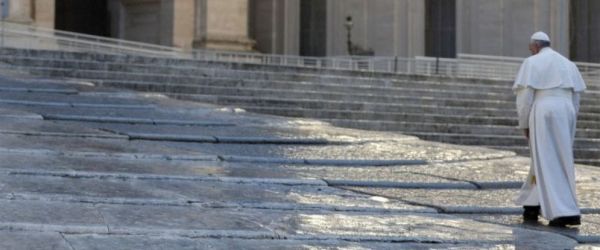Today we celebrate the solemnity of Mary Immaculate, which takes place within the context of Advent, a time of expectation: God will accomplish what he promised. But on today’s feast day we are told that something has already been accomplished, in the person and the life of the Virgin Mary. Today we consider the beginning of this fulfilment, which is even before the birth of the Mother of the Lord. In fact, her immaculate conception leads us to that precise moment when Mary’s life began to palpitate in her mother’s womb: already there was the sanctifying love of God, preserving her from the contagion of evil that is the common inheritance of the human family.
In today’s Gospel the Angel’s greeting to Mary resounds: “Hail, full of grace, the Lord is with you!” (Lk 1:28). God has always thought of her and wanted her in his inscrutable plan, to be a creature full of grace, that is, full of his love. Yet, in order to be filled it is necessary to make room, to empty oneself, to step aside. Just as Mary did, she who knew how to listen to the Word of God and trust totally in his will, accepting it unreservedly in her own life. So much so that the Word became flesh in her. This was possible thanks to her “yes”. To the Angel who asks her to be ready to become the mother of Jesus, Mary replies: “Behold, I am the handmaid of the Lord; let it be to me according to your word” (v. 38).
Mary does not lose herself in reasoning, she does not place obstacles in the Lord’s way, but she promptly entrusts herself and makes room for the action of the Holy Spirit. She immediately makes her whole being and her personal history available to God, so that the Word and the will of God may shape and bring them to fulfilment. Perfectly corresponding to God’s plan for her, Mary then becomes the “all beautiful”, the “all holy”, but without the slightest shadow of complacency. She is humble. She is a masterpiece, whilst remaining humble, small, poor. In her is reflected the beauty of God which is all love, grace, gift of self.
I would also like to underline the word with which Mary defines herself in her surrender to God: she professes herself “the handmaid of the Lord”. Mary’s “yes” to God takes on from the beginning the attitude of service, of attention to the needs of others. The visit to Elizabeth which immediately follows the Annunciation testifies this concretely. One’s availability to God is found in one’s willingness to take on the needs of one’s neighbour. All of this without clamour and ostentation, without seeking places of honour, without advertising, because charity and works of mercy needn’t be exhibited as a trophy. Works of mercy are done in silence, in secrecy, without boasting of doing them. Even in our communities, we are called to follow the example of Mary, practicing the style of discretion and concealment.
May the feast of our Mother help us to make our whole life a “yes” to God, a “yes” made of adoration of him and of daily gestures of love and service.
[Pope Francis, Angelus 8 December 2019]












